#it is part of the narrative which means it has implications
Explore tagged Tumblr posts
Text
Umineko Episode 3 Blog: Once Upon A Time
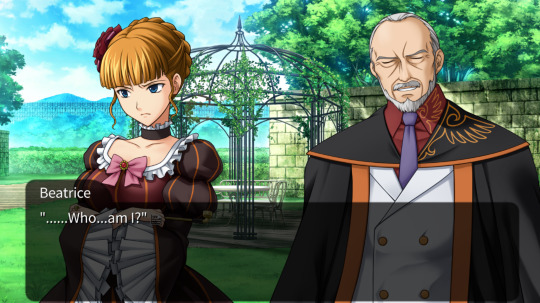
I had a feeling a topic like this would eventually come up. There are only so many "unforgivable" things a man in Kinzo's position could have done to his unrequited love. Somehow, it seems the truth was far worse than I thought.
I had found Episode 2 to be a largely uneventful affair. I liked the focus on Shannon and Kanon's characters at the start, and their relationship to "Beatrice," and Rosa was a riot as usual, but beyond that a huge chunk of it felt like I wasn't really getting much new information. Episode 3 kind of feels like Episode 2, but better. The magic part of the story is more interesting and has more meaningful implications on the mystery side of the story instead of being random nonsense, the game throws interesting twists on the mysteries of the previous games (killing off all of the servants on 1st Twilight was such a cool idea), and Ryukishi has provided so much important context regarding the killer's motivations, where before all we knew was that it was Sayo and her reasons had something to do with her solving the epitaph.
I'm told that people at the time found Episode 2 too difficult, and Episode 3 was in some ways a response to that, which is why we get treated to Virgilia explaining what an unreliable narrator is to Battler for the sake of those poor souls who hadn't caught on up to this point. It seems like Umineko has finally finished establishing its basic narrative tricks, and now we get to just have fun with it, although "fun" is maybe the wrong word for the main topic of this post.
Beatrice gets a bit shifty about explaining her backstory, as we'd expect from her. She wants us to believe that her death, as witnessed by Rosa, makes it impossible for the secret mansion to have any connection to the Rokkenjima murders, but it's clear that the Beatrice in the prologue is not the one from Rosa's story. Unfortunately, we've gone full Yu-Gi-Oh at this point and we have way too many different Beatrices running around, so for the sake of my sanity:
Beatrice I: Kinzo's mistress from long ago. May or may not have provided gold. Commit suicide after her daughter was born.
Beatrice II: Daughter of Beatrice I and Kinzo. Met Rosa. Died after falling off of a cliff.
Beatrice III: girl who broke a vase in the prologue. Describes Kinzo as her grandfather, which, troublingly, means she's probably Beatrice II's daughter.
Beatrice: Battler's nemesis in the meta-plot. On a metaphorical level, she's sort of a vague amalgamation of everything and everyone who's received the name of the golden witch.
Virgilia: Beatrice III's caretaker, who appears in the meta-plot and magic narrative as a mentor witch. In reality, Virgilia is Kumasawa. It's a well-executed Chekov's Gun: we were told in Episode 1 that Kumasawa often quits and then comes back after a while. The implication seems to be that whenever Kumasawa "quits" working for the Ushiromiya family, she's actually just being reassigned to the secret mansion to look after whichever Beatrice is staying there.
Sayo: masterminded the Rokkenjima killings, while occupying the role of the golden witch.
Eva: Kinzo's eldest legitimate daughter. Took over a significant chunk of the killings in Episode 3, after solving the epitaph. Was it simple greed, or are we again finding out that the epitaph hides an additional secret that makes those who solve it lean toward committing the killings?
EVA: Eva's inner child turned witch. Typically appears in the magic narrative to explain away the killings. Symbolically represents that Eva and Sayo do not have the same ends, even if they end up using the same means.
Ange: I guess they're just letting anyone be a witch these days.
Beatrice's explanation about being locked in the body of Beatrice II tells a horrid story between the lines: Kinzo had a daughter with his mistress, and after her death, he groomed his daughter to serve as her replacement. The fact that Kinzo has an extra grandchild we can't account for would seem to imply that he tried it twice. Beatrice tries to obscure this fact by working through Rosa, who didn't have enough context to understand the situation.
In any case, based on the timeline I'm guessing that Beatrice III is Sayo. She's the only realistic candidate I can think of who's involved in the story, and explains a lot. The servants are willing to work with Sayo out of a sense of obligation toward her, both because Kumasawa at the very least probably feels a lot of guilt at being complicit in the situation, and because Sayo probably became the de facto head after Kinzo died. I bet he'd sooner appoint her than anyone else in his family, although the rest of the family would certainly have disputed the claim if she'd come forward initially.
I do wonder what Kinzo was thinking having Sayo become a servant. Maybe a cover story, since the truth behind her birth was too shameful to admit? Another possibility is that the servants just got one over on ol' Kinzo and sent Sayo to the orphanage at some point, pretending she was someone else. I feel like Sayo had to end up at the orphanage somehow, even briefly as part of her cover story, since she needs to meet Kanon at some point.
The implications of this on Sayo and George's relationship aren't great, but we've already crossed that line by now, and Episode 2 did establish that Shannon avoids being physically intimate with George. Did Shannon enter this relationship in some attempt to get control over the family's assets, knowing that her claim would not be respected under normal circumstances, or did she only come to fully understand who she was and where she came from after solving the epitaph?
Sayo's connection to Beatrice feels very different now. Sayo probably doesn't even remember her mother, so the closest she's got is the legend of the witch. No wonder she takes on that role to get revenge on the family. The whole theme in the first letter of taking back what's rightfully hers fits much better as well.
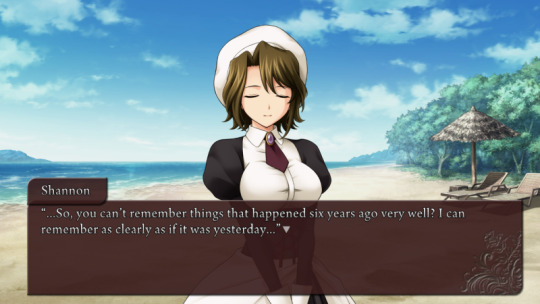
We still don't fully understand Sayo's motivations. The whole conversation on the beach about Battler's childhood crush really feels like it's foreshadowing a reveal later. I'm guessing it's something like: Battler threw out a cringy line about coming back for Sayo on a white horse because he was 12, and then ditched the family. Back in Episode 1, George asked Shannon why she had stayed employed as a maid for so long, after already saving a fair amount of money. The truth was that Sayo was envious of Battler leaving everything behind, and, like her mother blindly trusting Rosa, she secretly clung to the childish notion that one day he really would come back for her and take her away from Rokkenjima and the Ushiromiyas, but instead Battler came back and implicitly revealed what she probably should have known: he never took it seriously, and that was the straw that broke the camel's back.
That's enough of that depressing topic. Next time, we get treated to Peak Eva Content.
#umineko episode 3#liveblogging#umineko liveblog#umineko when they cry#umineko no naku koro ni#umineko
17 notes
·
View notes
Text
I have.. yet again.. a crack theory
This fever dream of a shot might be the creator's intent to state - pay attention to the combadges; they hold clues, especially given the moment they show it in

And then, if you pay attention to Chakotay’s combadge(s), you’ll notice the scene later where Chakotay presents her with her old Voyager combadge to remind her of her command anniversary.


What does this imply? You guessed it - pay attention to the combadges again. If you do, and it’s literally a blink-and-you-miss-it moment, it seems they accidentally switched combadges and then switched them back.




The thing is, there are too many coincidences for this to be accidental. If it was an accident, then holy heck, did they get lucky that it made sense like this and perfectly fell into place.
If the show wanted to hint at a more personal interaction off-screen that led to this accidental switch, it would likely do so in a nuanced way that respects the tone of the series. An accidental switch of combadges could be a clever way to imply an intimate moment without directly addressing it, keeping the content appropriate for all viewers.
I am now once again deluding myself ... help
Bonus shot just to make everything super confusing... when it doubt, wear two combadges at once confirming all theories and creating a paradox of your own

#star trek prodigy#janeway x chakotay#j/c#I am now actively starting to ignore whatever KM says#after having a chat with a friend who analises films as part of his everyday job he is right in one thing#actors can say whatever they want but the show will always be the source of truth#and most times creators do put hints like this when they wanna say something#even if this was an accident... see thing is... this still happened in the show#it is part of the narrative which means it has implications
20 notes
·
View notes
Note
Do you conlang? I was wondering if you had naming languages (or possibly even more developed ones) for pulling the words you use. I tried to search your blog but didn't find anything, wouldn't be surprised if the feature is just busted tho. Your worldbuilding is wonderful and I particularly enjoy the anthropological and linguistic elements.
Ok the thing is I had kind of decided I was not going to do any conlanging because I don't feel like I'm equipped to do a good job of it, like was fully like "I'm just going to do JUST enough that it doesn't fail an immediate sniff test and is more thoughtful than just keysmashing and putting in vowels". And then have kinda been conlanging anyway (though not to a very deep and serious extent. I maybe have like....an above average comprehension of how language construction works via willingness to research, but that's not saying much, also I can never remember the meanings of most linguistic terms like 'frictives' or etc off the top of my head. I'm just kinda raw dogging it with a vague conceptualization of what these things mean)
I do at least have a naming language for Wardi (and more basic rules for other established languages) but the rudimentary forms of it were devised with methods much shakier and less linguistically viable than even the most basic naming language schemes, and I only went back over it LONG after I had already made a bunch of words so there's some inconsistencies with consonant presence and usage. (This can at least be justified because it IS a language that would have a lot of loanwords and would be heavily influenced by other language groups- Burri being by far the most significant, Highland-Finnic and Yuroma-Lowlands also being large contributors)
The 'method' I used was:
-Skip basic construction elements and fully move into devising necessary name words, with at least a Vibe of what consonants are going to be common and how pronunciation works -Identify some roots out of the established words and their meanings. Establish an ongoing glossary of known roots/words. -Construct new words based in root words, or as obvious extensions/variants of established words. -Get really involved in how the literal meanings of some words might not translate properly to english, mostly use this to produce a glossary of in-universe slang. -Realize that I probably should have at least some very basic internal consistency at this point. -Google search tutorials on writing a naming language. -Reverse engineer a naming language out of established words, and ascribe all remaining inconsistencies to being loanwords or just the mysteries of life or whatever.
I do at least have some strongly established pronunciation rules and a sense of broad regional dialect/accents.
-'ai' words are almost always pronounced with a long 'aye' sound.
-There is no 'Z' or 'X' sound, a Wardi speaker pronouncing 'zebra' would go for 'tsee-brah', and would attempt 'xylophone' as 'ssye-lohp-hon'
-'V' sounds are nearly absent and occur only in loanwords, and tend to be pronounced with a 'W' sound. 'Virsum' is a Highland word (pronounced 'veer-soom') denoting ancestry, a Wardi speaker would go 'weer-sum'.
-'Ch' spellings almost always imply a soft 'chuh' sound when appearing after an E, I, or O (pelatoche= pel-ah-toh-chey), but a hard 'kh' sound after an A or U (odomache= oh-doh-mah-khe). When at the start of a word, it's usually a soft 'ch' unless followed by an 'i' sound (chin (dog) is pronounced with a hard K 'khiin', cholem (salt) is pronounced with a soft Ch 'cho-lehm')
-Western Wardin has strong Burri cultural and linguistic influence, and a distinct accent- one of the most pronounced differences is use of the ñ sound in 'nn' words. The western city of Ephennos is pronounced 'ey-fey-nyos' by most residents, the southeastern city of Erubinnos is pronounced 'eh-roo-been-nos' by most residents. Palo's surname 'Apolynnon' is pronounced 'A-puh-lee-nyon' in the Burri and western Wardi dialects (which is the 'proper' pronunciation, given that it's a Kos name), but will generally be spoken as 'Ah-poh-leen-non' in the south and east.
-R's are rolled in Highland-Finnic words. Rolling R's is common in far northern rural Wardi dialects but no others. Most urban Wardi speakers consider rolling R's sort of a hick thing, and often think it sounds stupid or at least uneducated. (Brakul's name should be pronounced with a brief rolled 'r', short 'ah' and long 'uul', but is generally being pronounced by his south-southeastern compatriots with a long unrolled 'Brah' sound).
Anyway not really a sturdy construction that will hold up to the scrutiny of someone well equipped for linguistics but not pure bullshit either.
#I actually did just make a post about this on my sideblog LOL I think in spite of my deciding not to conlang this is going to go full#full conlanging at some point#The main issue is that the narrative/dialogue is being written as an english 'translation' (IE the characters are speaking in their actual#tongues and it's being translated to english with accurate meaning but non-literal treatment)#Which you might say like 'Uh Yeah No Shit' but I think approaching it with that mindset at the forefront does have a different effect than#just fully writing in english. Like there's some mindfulness to what they actually might be saying and what literal meanings should be#retained to form a better understanding of the culture and what should be 'translated' non-literally but with accurate meaning#(And what should be not translated at all)#But yeah there's very little motivation for conlanging besides Pure Fun because VERY few Wardi words beyond animal/people/place names#will make it into the actual text. Like the only things I leave 'untranslated' are very key or untranslatable concepts that will be#better understood through implication than attempts to convey the meaning in english#Like the epithet 'ganmachen' is used to compliment positive traits associated with the ox zodiac sign or affectionately tease#negative ones. This idea can be established pretty naturally without exposition dumps because the zodiac signs are of cultural#importance and will come up frequently. The meaning can get across to the reader pretty well if properly set up.#So like leaving it as 'ganmachen' you can get 'oh this is an affectionate reference to an auspicious zodiac sign' but translating#it as the actual meaning of 'ox-faced' is inevitably going to come across as 'you look like a cow' regardless of any zodiac angle#^(pretty much retyped tags from other post)#Another aspect is there's a few characters that have Wardi as a second language and some of whom don't have a solid grasp on it#And I want to convey this in dialogue (which is being written in english) but I don't want it to just be like. Random '''broken''' english#like I want there to be an internal consistency to what parts of the language they have difficulties with (which then has implications for#how each language's grammar/conjugation/etc works). Like Brakul is fairly fluent in Wardi at the time of the story but still struggles#with some of the conjugation (which is inflectional in Wardi) especially future/preterite tense. So he'll sometimes just use the#verb unconjugated or inappropriately in present tense. Though this doesn't come across as starkly in text because it's#written in english. Like his future tense Wardi is depicted as like 'I am to talk with him later' instead of 'I'll talk with him later'#Which sounds unnatural but not like fully incorrect#But it would sound much more Off in Wardi. Spanish might be a better example like it would be like him approaching it with#'Voy a hablar con él más tarde' or maybe 'Hablo con él más tarde' instead of 'Hablaré con él más tarde'#(I THINK. I'm not a fluent spanish speaker sorry if the latter has anything wrong with it too)
46 notes
·
View notes
Text
i don’t actually mind iterations of AB where she’s ‘mean’ (…again, whatever the fuck that means in the 16c); but i really do reject portrayals where she’s completely devoid of warmth. unfortunately for me, one of them has remained #1 prestige ‘blueprint’ tudor drama since 2012 😭
#I actually realized this too…#that it’s the source material#you can point to (few and far between ; but they do exist) moments of warmth in wolf hall and tobg#but ONLY in the screen adaptations#the source material of the books literally don’t have any#it’s the adapter tweaking so that the audience doesn’t *totally* hate her bcus that’s not really#constructive for the purposes of the narrative / storytelling ….#for them to be 100% alienated from her as a character and personality#so they tweak it to what. 98% . lol#primarily with her moments of tenderness with Elizabeth#and I mean I’ll take what I can get insofar as I think that very tiny aspect is an integral part of her#so infinitesimal props#but they don’t allow it in any other aspect#so the implication is that motherhood ‘humanized’ her and she was otherwise#not quite human. which. I shouldn’t have to say#has fairly gross implications about how these creators see women overall…
39 notes
·
View notes
Text
I don't strictly "like" taking ADHD meds, the comedown is awful and they play havoc on my appetite. But I kinda need them. I write software for a living. Software requires a great deal of focus that I simply cannot muster up off my meds. If I didn't have my meds, I would lose my job.
Part of this can be blamed on the cruelties of our modern capitalistic system. If the world understood my condition better, maybe I would not need to take stimulants to survive. I read an article once that really went all in on the idea that ADHD's negative perception is a symptom of perception, not an objective truth. Maybe people with ADHD are just as capable, but they do things in a different way to neurotypicals. Maybe all we need is better support, and social solutions, and more understanding of the different way that ADHDers think.
Which is all very compelling. Except.
I often find myself procrastinating activities that I want to do. My apartment has been accumulating dust because I keep forgetting to vacuum. One time I let the dishes in my sink stack too high and it was months before I could get myself to clean the mould off them. The demands of capitalism mean I need to software to pay rent, but sometimes I just want to do software, and no amount of narrative reframing or social support will clear the noise in my head long enough to let me focus on the code.
The notion that ADHD isn't a deficiency, just a different way of thinking, is something I find condescending. The implication here is I shouldn't have to write software, I should be given a different job, and I shouldn't have to maintain my own apartment, I should have the support of my community coming into my room and cleaning my things. But what if I want to do those things? What if I like software, or the privacy of an atomised existence? Maybe society has no right to decide what the correct way to live my life is, but surely I do!
The reason it sucks that it's hard for me to keep my dishes clean is not because the world says so, it is because I say so. It is because sometimes I want to be able to remember to do things and it sucks that I cannot live my life in the way that I want.
1K notes
·
View notes
Text
reminder that the only reason the "ADHD is actually demigod BATTLE STRATEGIES" and "dyslexia is DEMIGOD BRAINS HARDWIRED FOR ANCIENT GREEK" things exist in the PJO universe is because it's a very direct reference to early 2000s teaching/parenting techniques for neurodiverse and disabled children, which aimed to frame childrens' disabilities and hardships as a "superpower" or strength so that the children would feel more positively about their disabilities or situations. This technique has fallen out of favor since then for the most part since more often than not it just results in kids feeling as though their struggles are not being seen or taken seriously.
Yes, demigods are adhd/dyslexic (and sometimes autistic-coded) in the series. This is extremely important and trying to remove it or not acknowledge it makes the entire series fall apart because it is such a core concept. Yes, canon claims that their adhd/dyslexia is tied to some innate abilities, which is based on an outdated methodology. It's important to acknowledge that and understand where it comes from! But please stop trying to apply it to other pantheons in the series like "oh, the romans have dyscalculia because of roman numerals!" or "the norse demigods have dysgraphia for reasons!" - it's distasteful at best.
A better option is to acknowledge the meta inspiration for why that exists in the series, such as explaining potentially that Chiron was utilizing that same teaching methodology to try and help demigods feel more comfortable with their disabilities and they aren't literal powers. In fact, especially given Frank, there's implication that being adhd/dyslexic isn't a guaranteed demigod trait, which means it's more likely to be normally inherited from their godly parent/divine ancestor as a general trait, not a power, and further supports the whole "ADHD is battle strategy" thing being non-literal. It also implies the entire greco-roman pantheon in their universe is canonically adhd/dyslexic - and that actually fits very well with the themes of the first series. The entire central conflict of the first series fits perfectly as an allegory about neurodiverse/disabled children and their relationships with their undiagnosed neurodiverse/disabled parents and trying to find solutions together with their shared disability/disabilities that the kid inherited instead of becoming distant from each other (and this makes claiming equivalent to getting a diagnosis which is a fascinating allegory! not to mention the symbolism of demigods inheriting legacies and legends and powers from their parents and everything that comes with that being equivalent to inheriting traits, neurodiversity, and disabilities from your parents).
anyways neurodiversity and disability and the contexts in which the series utilizes representation of those experiences particularly during the 2000s symbolically within the narrative is incredibly important to the first series and the understanding of what themes it means to represent. also if i see one more "the romans have dyscalculia instead of dyslexia" post in 2023 i'm gonna walk into the ocean.
#pjo#riordanverse#percy jackson#analysis#meta#adhd#dyslexia#also this symbolism recontextualizes the relationship between demigods and their godly parents so much#particularly Percy and Poseidon and the whole ''I'm sorry you were born thing'' like DAMN that's an ENTIRE DIFFERENT IMPLICATION#honestly in general the first series' meta analogy of being a demigod as symbolism for being neurodiverse/disabled ROCKS SO HARD#that's SO COOL and im SO SAD NOBODY EVER TALKS ABOUT IT#i could write a whole essay on that alone like COME ON GUYS#can we PLEASE ACKNOWLEDGE THIS I WANNA TALK ABOUT THE COOL DISABILITY METAPHORS....#anyways i didnt proofread this cause. re: dyslexia so if it doesnt make sense dont worry about it#i can try to explain further in supplementary posts if people so wish
3K notes
·
View notes
Text
Holy fuck Welcome to Noxus is amazing.
And I do mean that. And part of the hype is for how it folds Arcane in, but it also kinda has me worried.
Like, with Arcane and its canon, the best approach to the timeline is to let all of the cuncurrent events that work in a comic-book like environment of connected but mostly self-contained stories (that necessitates that concurrentness given the scope of the stories and the number of artists working on different parts at any given moment) to be spread out into a much larger timeline. Where a strong narrative drive can be better explored.
And with the state of the Noxian invasion of Ionia, especially the Singed of it all, it would be, imo, the best interest of the story to make Arcane as early in this timeline as possible. Before the first invasion of Ionia, AT LEAST. Makes sense, right?
But we see Katarina going against the Black Rose. And we see them talk about the next move while teasing what seems like Riven's Blade. And all of that is very much post-invasion stuff. Like, Katarina has her daggers infused, which also means we're post J3's death and in the middle of the Mage rebellion in Demacia, which is something that with "The Arcane is waking up" from the show, would have fit much more easily into the Sylas is recruited by the mageseekers part of that plotline than being forced to be happening right now.
We're currently 1 step removed from Arcane and shit is already looking wobbly at the seams because it was never intended to work like this, and even though Welcome to Noxus was incredibly hype and might be dethroning RISE to me, it very much needs you not to think too much about the broader universe implications, despite its purpose being trying to sell me on that broader universe.
#Arcane#League of Legends#Noxus#Welcome to Noxus#Piltover#Zaun#Demacia#Ionia#Freljord#Katarina#Talon#Mel Medarda#LeBlanc#Vladmir#Darius#Trundle#Elise#Black Rose#LOL
189 notes
·
View notes
Text
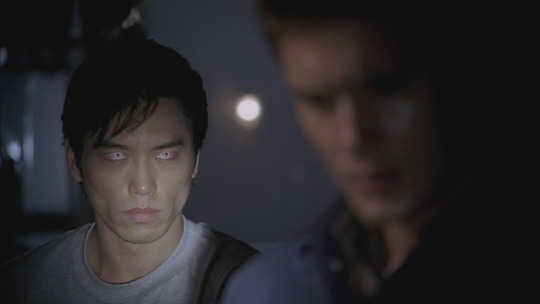
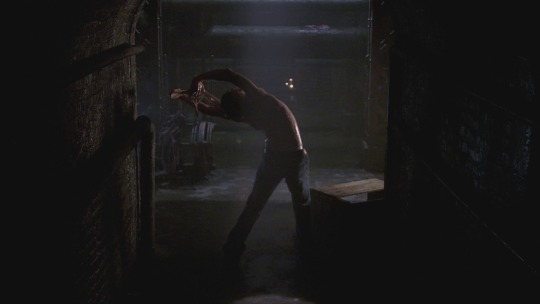
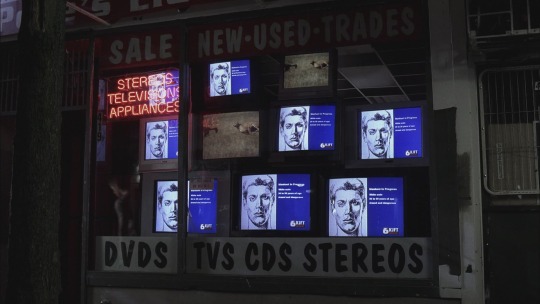
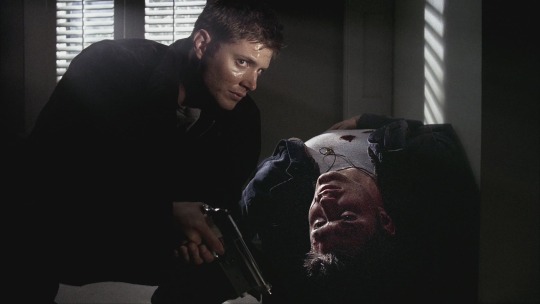
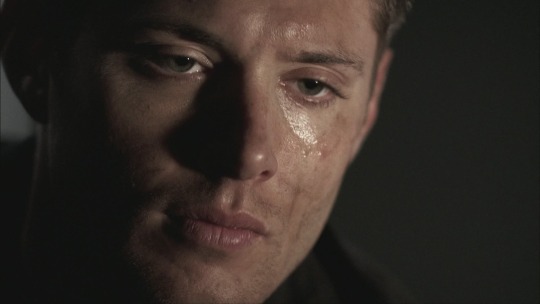
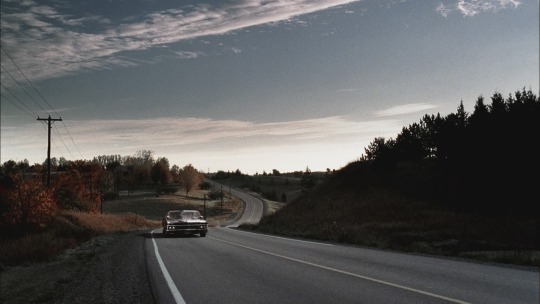
Favorite Shots Per Episode ✩ 1.06 Skin (3/3)
cinematography analysis and queer reading under the cut
It's of course very obvious that the shapeshifter is functioning as a mirror to Dean, but I still find it fascinating how this is depicted in the cinematography. Because the director isn't using physical mirrors, despite them being such a popular trope in horror for showing the true self or the mental state or metamorphosis of a character. The only time where you sort of see one is in a foreshadowing shortly after the establishing shot with the side-view mirror (which I absolutely love):
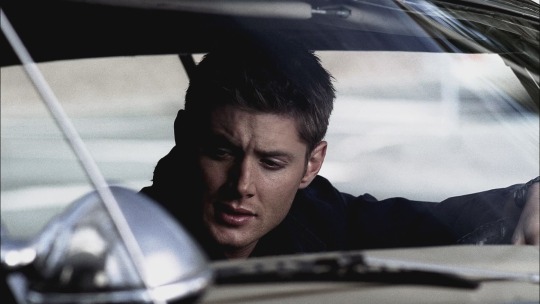
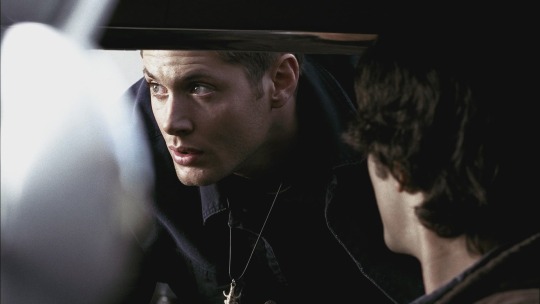
But for the rest? Not really. I always wonder if interpret waaaay too much into certain frames, but I am kind of obsessed with how Dean and Becky are divided by the crime scene tape in this shot. Becky is the victim. Dean, well Dean? He's the monster. Kind of. I think a lot of the reflection in this episode happens through what Dean is not also, and he's are not living the lives of 'normal' people. I love how the directing of the episode shows early on that Dean does not belong to that part of society, just like the shapeshifter.
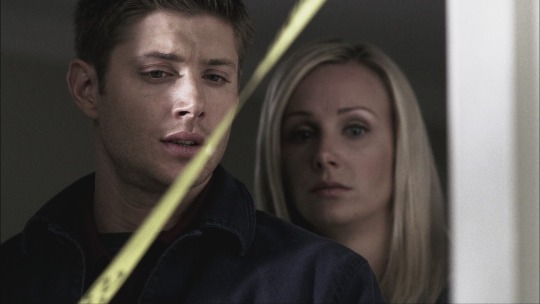
I mean I obviously am doing a queer reading of that (being queer myself), with the monstrous and othered bodies in media being those that are not conforming to various aspects of white cishet society. But I am going to say - the implication that there is a sort of inherent tragedy to Dean's life, not just a sense of not belonging because of his 'lifestyle' but also the fear of being monstrous enough to destroy other people's bodies and livelihoods? Ugh. It hurts, and it's sadly coming back in anti-queer narratives to this day. But yeah, as I said, Dean is portrayed in a way that is disconnecting him from the rest - also from Sam who is the link to this 'normal' life by knowing Becky and who has kept Dean from 'being himself' by pursuing his own dreams and conforming to the exact society that Dean is not belonging to, letting Dean behind in a position where he's neither free to be himself nor enough to be someone else -, and that is giving him a sameness to the shapeshifter.
Dean has to hide the queer part of himself, in a desperate attempt to be accepted, mirrored by the monster of the week: "So maybe this thing was born human but was different, hideous and hated...until he learned to become someone else."
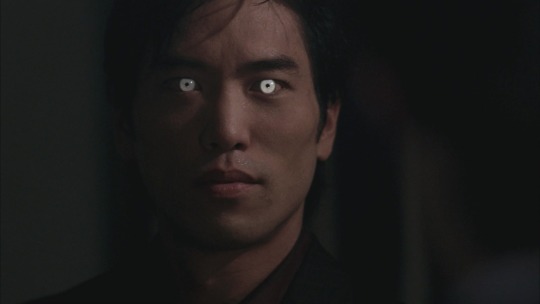
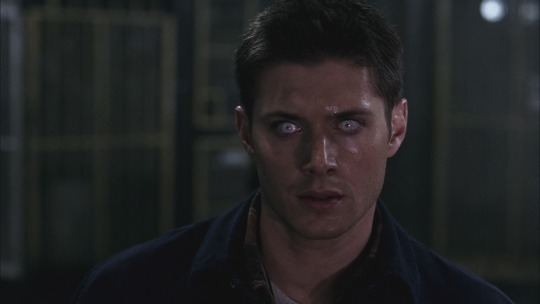
I think that's why I am also obsessed with these shots. Because both the shapeshifter and the shapeshifter as Dean are getting one, revealing their true self underneath the mask that is this body, a body that is subjected to other people's ideas and is projected on and isn't their own. But also the eyes are mirrors? The body part described as the 'mirror to the soul'. It's a little cliché and on the nose, but I find it way cooler than just working with physical mirrors, you know?
And yeah, when it comes to reflections, of course, we cannot forget this scene:
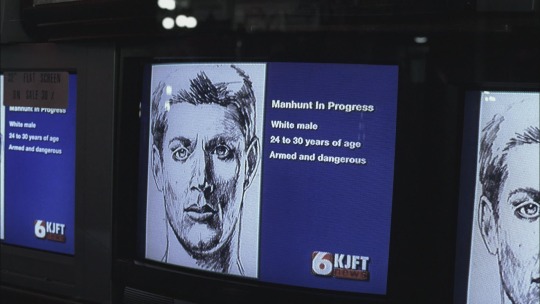
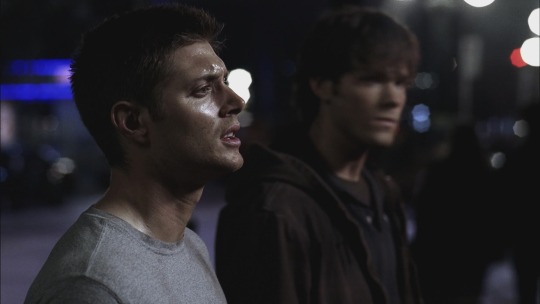
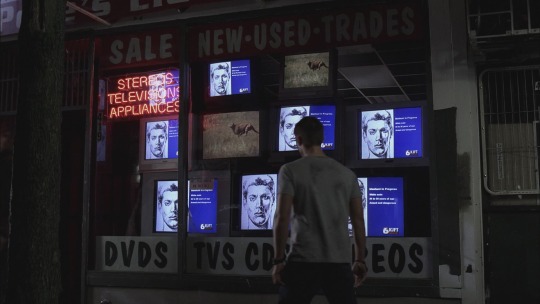
Which is Dean seeing himself, but more so is actually Dean seeing how he is perceived by others. It's not a depiction of his actual self, it's a depiction of the concept of him. We know this, we know Dean is not the 'bad guy' that is televised nor is it an accurate portrayal of him. But I think that it serves to show the audience how media is a place that can shape ideas and construct norms, and it also serves as a way to remind Dean that this is how he will be reacted to if he dares to 'become' monstrous. If he dared to be like the shapeshifter, the outcast, and put his own being over his responsibility to conform. Despite his brother Sam being allowed the same egoism - but Sam's egoism is striving to conform, he's [email protected] you know, and Dean's egoism is striving to be free, to regain control over his body.
And then we have this shot.

Followed by this shot.

Dean 'killing' this reflection of himself, this part of himself in favor of serving and saving. He's a freak, but he's not just a freak like Sam in that he's currently living the hunter lifestyle and didn't really fit into Stanford. Because - well, he's different than Sam. Queer. He's isolated, alone, born hated like the shapeshifter if he ever lived his true self, yearning to be loved. The shapeshifter literally says it: "All he wants is for someone to love him. He’s like me. You know, everybody needs a little human touch now and then. It’s so hard to be different." I think this episode hits so hard for me because you can see Dean's self-hatred, especially in that last shot, Dean's internal struggles that he hides so well under his hero-esque facade. But also how he is ultimately a loving and caring person, putting everyone's happiness above himself.
I think despite this episode reading like being queer is an inherent tragedy at first glance, it walks a fine line in actually trying to convey quite the opposite. Dean is other, but the other isn't bad. Yes, he does good by suppressing himself, so does that mean he has to act according to others to be happy? I don't think that is what the episode is saying. I think it is more an example of Dean's 'monstrosity' being not the same as the shapeshifter's monstrosity in the end, that despite all the sameness they aren't one. That despite what society depicts him to be, evil and harmful to others, he isn't this mirror image projected onto him. He isn't what was shown on those televisions, or in a wider sense, the media. He isn't what is hunted down by the SWAT team, or in a wider sense, institutions in power. Dean's self IS good. Dean's self IS caring and loving, despite his fear to pursue his own dreams and be free, and it's not coming through his actions of suppressing those desires, but because he ultimately is neither those 'normal' people nor the shapeshifter, but his own truth. So yeah, while I think this episode definitely walks a dangerous path by having Dean continue to live this old life in the end, the cinematography in this episode also functions to reveal how - while horror is a love letter to the monstrous, represents counter-narratives and helps to deconstruct normativity (like in this episode!) - the monstrous is often instrumentalized to suppress and oppress and depict victims as an inherent danger to the established systems of oppression. Dean's true self isn't bad. People are just made to believe that it is.
#spn#supernatural#spn 1x06#dean winchester#spn screencaps#spn meta#spn screenshots#spn 1.06#skin#spn skin#dean#screencaps#screenshots#stills#val's favorite shots#meta
228 notes
·
View notes
Text
there was a lot of mistakes made in the live action but the worst one without reservation was that the creators did not understand patriarchy and they did not understand women's liberation outside of an american context ( or any context if we're being honest )
it's easy to see on a surface level how that fucked up katara's whole character how she wasn't allowed to have her character defining moments how she wasn't allowed to be angry or even excited or impulsive but i think it doesn't really become clear how deeply wrong the show's conception of gender & patriarchy is (and the implications for the political landscape of the show) until you get into how they destroyed sokka's character too
sokka's whole Complex is born of patriarchy. i'm not trying to do men's rights advocacy here but in my experience when a people is under constant threat, constant assault, constant violence (much of which is gendered) and the traditional "protectors" or "providers" of that people are men, the masculine role becomes protecting women and children. i am not saying this is a good thing or a bad thing but it is true the narrative of violent resistance is overwhelmingly about men. to be a man in a time & place like this means fighting to protect your women, & to die for them is honorable. that is where sokka gets this idea that he has to be a warrior & he has to fight & if necessary die for katara & the rest of the tribe. it's about duty. everyone has a part to play, a role to fill
everyone including women! which is the other half of this. the duty of women is to keep up the home, to maintain a country worth fighting & dying for, to raise children so that the community can have a future. it becomes especially obvious in the context of the show when you see how the nwt lives & in specific how yue lives and dies.
many women participate in patriarchy. many colonized women participate in patriarchy. most of my family comes from or still lives in a country completely devastated by colonialism & its aftereffects & many women in my family believe wholeheartedly in the idea that everyone in the house has a role to play. it's not because these women are stupid or they hate themselves. but when you grow up believing that men & women are fundamentally different, and seeing that women are in specific danger because of their gender, it actually makes a lot of sense to expect the men in your family to protect you, and to raise your sons that way.
in practice that means that men aren't really expected to do anything around the house, especially when there's no actual danger. my aunt literally 2 days ago told me this lol like she doesn't make her sons do anything bc she wants to let their lives be easy before they have to go out into the world & take care of their wives & children.
what does women's liberation look like when an entire community is under threat? colonized women have been dealing with this question as long as colonialism has existed. the writers of this show don't even pretend to understand the question, much less to formulate a thoughtful response to it. they just say oh, well, katara, yue, & suki are all the exact same type of liberated girlboss for whom patriarchy is no significant obstacle.
which brings us back to sokka lol. sokka, at the beginning of the show, has completely subscribed to patriarchy, has integrated it into his sense of self. he has a lot of flaws, but he also has a lot of really good traits. his bravery, sense of honor, loyalty, work ethic, selflessness, all of this came from him striving to be a good man. he would die to protect katara, because she's his sister. he also has her wash his socks & mend his clothes, because she's his sister. even after he meets suki, humbles himself, & expands his view of the role a woman can play, he doesn't completely disengage from patriarchy. at the end of the day he believes in his soul that a good man's duty is to fight & if necessary die for his people, & that's exactly his plan. this is a very real psychic burden. pre-aang, it's also largely fictional & completely ridiculous. we're SUPPOSED to think it's ridiculous. he's spending his time training babies & working on his little watchtower. the swt hasn't been attacked since their mother was killed because it has been completely stripped of all value or danger it once held for the fire nation, & everybody knows this. there is very little "men's work" left, aside from hunting & fishing, which is so damaging to sokka's self image he resorts to toddler bootcamp to feel useful. the contradiction here is comical. it's also completely devastating. that's supposed to be the fucking POINTTTT like colonialism & patriarchy convinces this young boy he needs to be a soldier & die for his family. & you know what he does? He acts like a young boy about it. they didn't just leave this unexplored in the remake they completely changed the circumstances to 1. make sokka incompetent for some reason 2. make his "preparations" seem less ridiculous. Which ruins the whole character. Possibly the whole show.
all this makes the writing of katara & the other women infinitely more offensive to me. katara is a good character because she believes in revolution. she wants to liberate her people from imperialism, & she wants to liberate women from colonial gendered violence, traditional patriarchy in her own culture, & the complicated ways those things interact. it is LITERALLY the first thing you're supposed to learn about her. she's the PERFECT vehicle to address the question of women's liberation under colonialism. one of the things i was most looking forward to seeing in this show was how labor is distributed in a place where almost everything that needs to get done is "women's work" & how it affects katara & sokka's day to day relationship when their lives weren't at risk constantly. what actually are her responsibilities every day, & how do they compare to sokka's? how does her grandmother enforce these traditions with katara & sokka, & how is that informed by her own experiences in the nwt? what does patriarchy look like in a tribe made up of mostly women & children? it's so important to who katara is & what she believes! but why bother exploring any of that when u could instead make her a shein model who has nothing in common with the source material except her hairstyle lol.
yue is actually even worse to me bc yue is supposed to be sokka's counterpart. she's supposed to show you how destructive it is for women specifically to internalize this gendered duty so completely. it sucks for sokka, but he is a man & thus his prescribed role gives him some agency. yue's role affords her no agency whatsoever, & this is the POINT. to make her someone who's allowed to break things off with her fiance if she likes, who sneaks off to do what she wants when she's feeling stressed, whose will is respected as a monarch, like what is even the point of yue anymore? in the original the whole reason she was even allowed to spend time with sokka was because her father knew she was with a trustworthy boy. her story completely loses all significance when the dimension of patriarchy is removed from it. the crux of her whole story is that she is not just a princess but the literal & spiritual representation of the motherland. that's what women are supposed to represent during wartime, at the cost of their own sense of self. in order to fulfill her duty to her people she gives her life to them in every single way that matters.
it's just so unbelievably frustrating (and WRONG) that the only types of characters for these writers are "soulless misogynistic fuck" and "liberated american-style feminist." there's no nuance at all! they don't bother exploring how real love manifests in patriarchal communities, & how patriarchy defines the limits of that love. or how for so many of these people their idea of goodness, morality, & honor is gendered. or how imperialism affects not just individuals but entire cultures & their conceptions of gender. but why do any actual work when you could completely change sokka & katara's general demeanors, their entire personalities, & their roles in the tribe so you can dodge any & all nuance
Anyways. in conclusion. it was bad
562 notes
·
View notes
Text
Why “Hiding in the Light” Didn’t Work: Stranger Things’ Psychospiritual Implications
Supplementary Sources: Jungian Theory & A Wrinkle In Time
Alright, buckle in. I’m running on a year’s worth of spiritual awakening, deep dives into Jungian theory and non-dualism, and my own ego’s primary coping mechanism: immersing myself in media as escapism. The purpose of this analysis is to break down the themes of non-dualism and light/darkness in ST (and maybe predict some character arcs), and also to position the narrative of ST as a psychospiritual wake-up call.
For some context: last year, I discovered the work of psychoanalyst (or philosopher, depending on who you’re talking to) Carl Jung. He had a pretty extensive theory about the human psyche that I immediately connected to the themes throughout Stranger Things, specifically Vecna’s mind control and curse. I’m going to break Jung’s theory down as succinctly as I can, and then delve into how it plays out in our favorite gay monster show.
But before I delve into Jung’s ideas, I also think it’s important to define selfhood (you’ll understand why in a minute). For the purposes of this analysis, the experience of the “self” is an illusion created by our senses, perceptions, memories, and consciousness, all of which are impermanent. Therefore, the self is what we call “conditioned.” There is no you or me, just the ideas we have of ourselves.
Now, we can get into Jung’s theory. He posited the following:
1. Every individual has a “persona” they show the world (a constructed self) to feel like they belong. Underneath this persona, everyone has a personal “shadow,” or the part of themselves they don’t want to acknowledge. This shadow is always projected onto others— every negative thought we have about someone else is a product of our own unintegrated shadow. Note: The shadow is NOT bad, it just “is.” It’s actually there to HELP us grow and integrate all the unhealed parts of us.
2. Individuals’ shadows are usually part of their unconscious, meaning most people are not aware of their shadow side or cannot bear to delve into their trauma/darkness and begin to heal it.
3. All of human consciousness is CONNECTED. This means two things. 1: There is a “collective unconsciousness” that contains the sum of all of our unintegrated trauma, and 2: We can heal our collective unconsciousness by healing our own unconsciousness.
How do we heal our own unconsciousness? By becoming AWARE of our shadow side, accepting and forgiving the conditioning that created it, and working to encourage others to do the same.
What— or rather, who— does that remind you of?
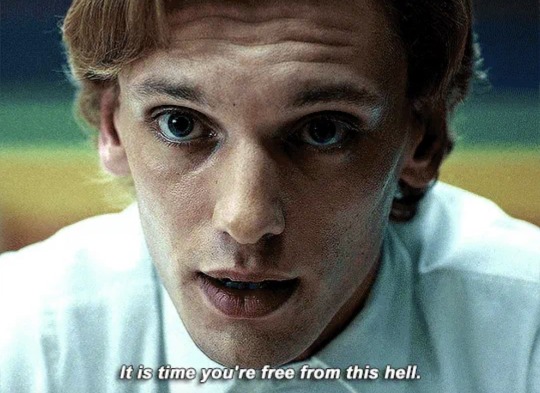
Also— great use of lighting here.
We know Vecna has direct access to his victims’ consciousness; not just their memories, cognition, and emotions, but also their awareness itself. This is how he’s able to target and trance people. But it’s not just their consciousness Vecna has access to; it’s their unconsciousness. Their shadow. Their trauma. Yes, he has psionic abilities akin to El’s, but as far as we know, El can’t access the collective unconsciousness like Vecna can. She is only capable of “remote viewing” via the void or piggybacking into people’s minds. So why is Vecna capable of this?
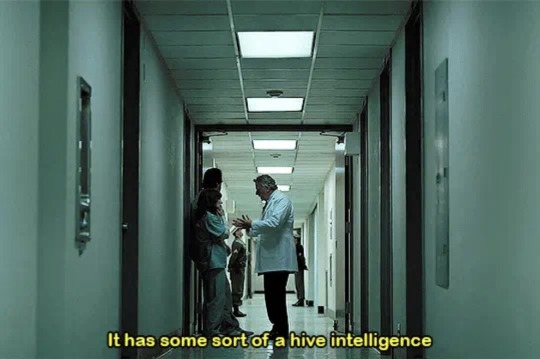
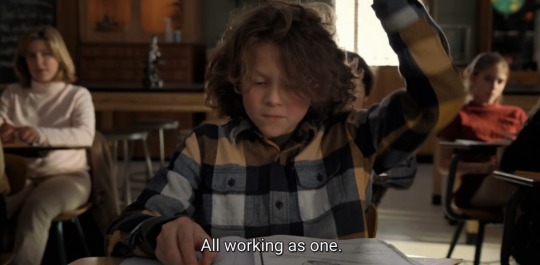
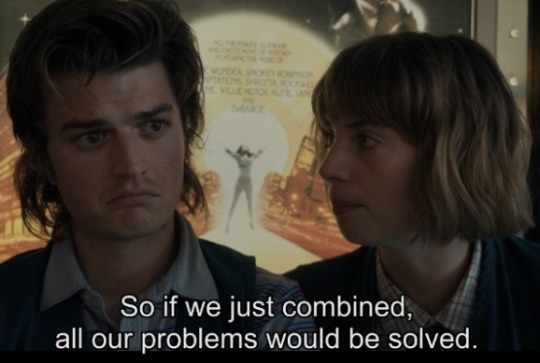
If you want my take on it: the only way to access a collective shadow would be through accessing your own shadow. So is Vecna really Henry, or his unintegrated shadow? And is either really condemnable, considering the larger themes of the show?
We see this theme of non-dualism echoed in Brenner’s NINA pep talk with El:
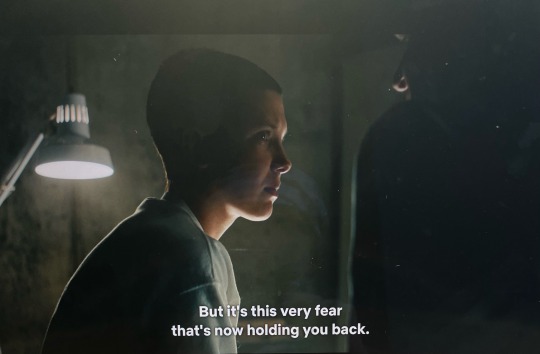
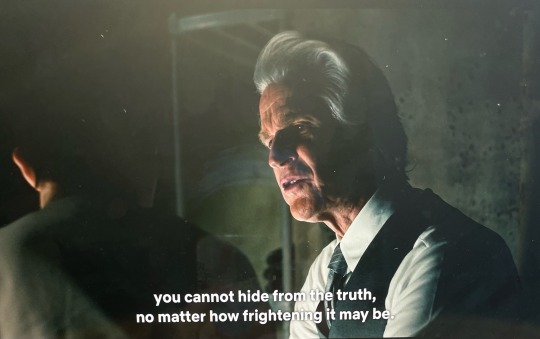
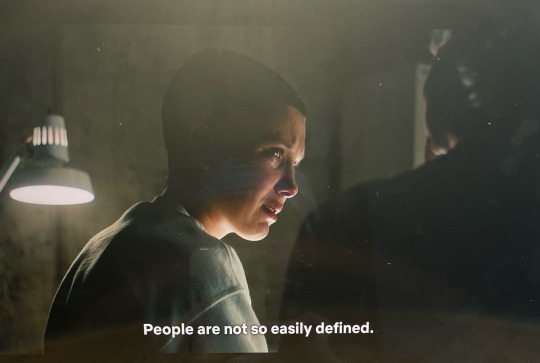
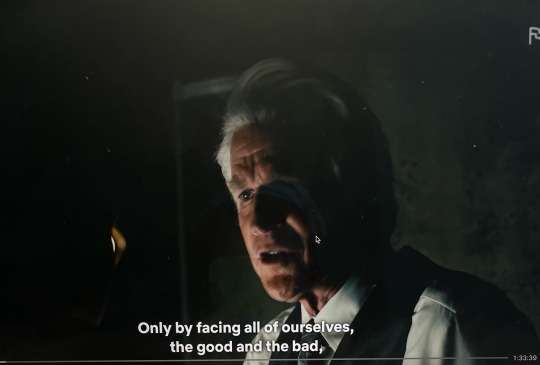
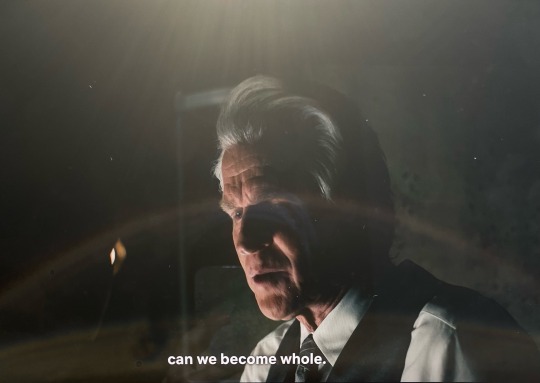
It’s fascinating to me that they’re communicating these bigger thematic ideas through the show’s “villians”— while the above conversation could be taken at surface-level as Brenner being manipulative, it’s important to acknowledge the truth of what he’s saying. NINA is only successful because El faces “the good and the bad.” This is why “hiding in the light” is a no-go for Max.
Focusing only on happy memories is a form of emotional bypassing. Throughout the show, we’ve been told time and again that hiding doesn’t work. Neither does running away. The only way out for our characters is through their own shadows.
Now, the fun part: predictions. Looking at all of this with a Jungian lens, it doesn’t make much sense to villianize a character or to end the story by “defeating evil.” In non-dual theory, there are no evil people, only unhealed ones.
We know what worked for our characters temporarily (Will in the UD, Max in her first trance, El using her powers against Vecna) was the memory and vibration of love.
This reminded me of A Wrinkle In Time, which is a science fiction novel that’s been noted more than a few times as one of Stranger Things’ primary influences. In the book, a girl and her brother travel through time to rescue their father from an alternate dimension where all beings are controlled in a hyper-individualist suburbia by a giant, all-knowing brain. The climactic “defeat” of the brain is shockingly simple, but incredible impactful— Meg, the heroine, tells it over and over that she loves it. This love ultimately brings her father and brother out of trances they are in, and they’re able to remember her and travel back home.
(Tangent: And God. The implications of that, outside of analyzing ST, are powerful. How do we live in a capitalist hellscape that is so caught up in the mind— in acheiving, obtaining, securing, protecting the ego— that many of us have forgotten our hearts? The answer is love. Loving ourselves more deeply to love all beings more deeply, “the good and the bad.” But love does not negate accountability, and it does not excuse harm.)
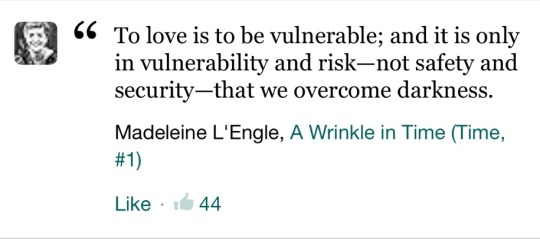
Our characters are all struggling with self-acceptance and self-love in some form or another. Each is wrestling with secrets and lies, and the desire to hide parts of themselves they think others can���t accept.
Mike is clearly struggling with self-loathing, guilt surrounding what happened to El in s1, and a crippling hero complex.
Will is also on the self-loathing train, continually self-sacrifices to his own detriment, and is hiding his identity out of fear (not at all villifying that, just for the record.)
El struggled to reconcile her abilities and forced weaponization with her identity outside of the lab pre-s4.
Max was suicidal and had a lot of self-hatred after B*lly’s death.
Nancy parallels Mike in her survivor’s guilt post-s1 and exhibits the same lack of self-preservation and self-sacrificing tendencies.
You get my point. So how will these characters overcome their trauma? Not through hiding, or running, or bypassing. Not through the light alone. Through love— acknowledgement of their own darkness, compassion for the unhealed nature of others, and commitment to being honest with themselves and their loved ones. We know Will is El and Henry’s mirror/foil and will play a central role in S5, and with all of this in mind I think it’s safe to say he will break the cycle of bypassing and hiding from trauma and pain once and for all. He won’t fight it like El, hide from it like Max, or run from it like he did as a kid.
Only by integrating their shadows can our characters become truly “themselves,” or as Brenner puts it, “whole.”
I will probably have much more to say about this after my re-read of A Wrinkle in Time, but for now, that’s all I’ve got. :) Hope everyone is doing well!
#i dont normally do posts like this but my brain has been whirring lately#stranger things#byler#mike wheeler#will byers#vecna#henry creel#st5 speculation#st analysis#stranger things analysis
203 notes
·
View notes
Text
I think yes, we can talk about manufacturing consent as this ongoing and systemic social process re the raping of transfemmes/camab genderweirdos... depraved, pathetic creatures who are desirous of any and all forms of attention and physicality, the abject as desire projected and epitomized...
And i think we could talk specifically about the feminist subject(yes this includes transmascs as many feminist spaces currently and historically demonstrate) in its relationality to this as 1. actors that are categorically unable to perpetrate sexual violence and 2. victims that are desired and objectified and hurt.
But i think it is worth discussing the ways in which narrative as an aspect of aspirational identity is thrust upon us. One presupposed on a bioessentialist understandings of sexual violence.
In the sense that the narrative of femaleness is one of being raped. You see this in the various responses to discussions of transmisogyny when cafab trans folx chime in to more or less effect "well us real females have real problems: we are raped" which has some implications no?
And so any claim of sexual violence done unto our milieau is met w scrutiny even from our cohorts and ourselfs. It seems to basically every1 tht we are trying to adopt the narrative of femaleness. Another instance of the impersonator dressing up. A mummers play with the dragon trying to claim real harm, subjectivity, personhood. Laughable if it werent so insulting.
And so this becomes part of the projected desire matrix. An implicit understanding that yes even if they dont want to(which they do), they want to be forced to. Which means thrs no way to rape them; thrs always a c at the beginning of the dna chain cncncncncncncnc.... so when we bring up even the possibility of sex violence its not only "u wanted it!" its "u wanted to be raped!" We want to be traumatized in the female way which makes it impossible for us to be such... Laughable if it weren't so insulting.
287 notes
·
View notes
Text
Marineford Law is no question interesting to me because he pulled off a surprise, motherfucker moment and the timing was so good to the point that both pirates and marines least expected it.
Before I proceed with this self-indulgent lawlu meta post, I will go ahead and say that everything that happened between them in Marineford is a catalyst of establishing their connection later on in the future arcs. I am a firm believer that those feelings™️ started to truly bloom in Punk Hazard and went downhill in a good way in Dressrosa.
Long post ahead. Enjoy!
When I was rewatching Marineford arc, the part where Buggy was already carrying an unconscious and injured Luffy and Jimbei, their conversation sparked my interest.
Highlighting the bit where Buggy was confused about Law's verbal tic of using the suffix -ya in referring to anyone, overall doubting him, then asking for Law's name. Don't forget that Law is a little shit (affectionate) so he proceeded to ignore all of those questions to say this:
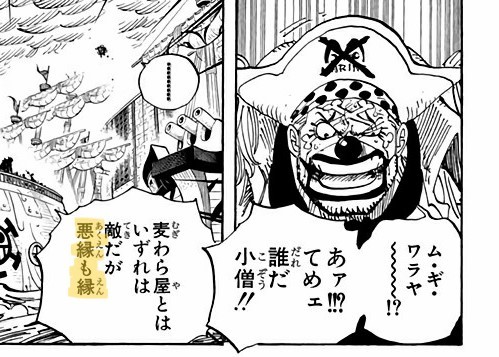
Interestingly enough, this part is tricky to translate. I found two translations that closely encapsulate what Law wanted to say here but mind you, and I will sound redundant about this with everything that has got to do with Trafalgar Law's speech patterns: he likes speaking in runarounds, purposely using terms with double meanings and connotations on them, and he's both reticent and cryptic. (I wouldn't say not to trust on his words but don't take them at face value.)
Law described his connection with Luffy as 悪縁 (akuen) which directly translates as evil destiny or connection.
Forgive me for a bit of sidetracking but the kanji used for akuen is the same with Robin's epithet which is "Demon Child" (akuma no ko). To further elaborate, 悪 (aku) means evil--both as intent and violating a moral code. It is also used to refer as the direct opposite of good.
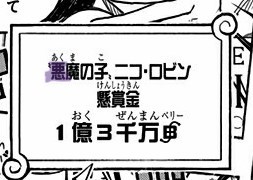
Going back to 悪縁 (akuen), in true Law fashion, this word doesn't only mean evil destiny or connection. Depending on the context, it can also mean unfortunate love.
(It sounds tragic coming from him, isn't it? If your mind was blown after this part, no worries, I am too. This part gave me so much whiplash when I was researching about it.)
So, considering these two interpretations of 悪縁 (akuen), that begs the question, what is Law's connection with Luffy?
On surface-level, they are enemies as Law said so himself. They're rivals when it comes to One Piece. Their common ground, which is only known among people that Law trusts the most, is sharing the same secret name of D. However, I will take one step ahead and say that they both went through the same tragic fate of losing their loved ones, for being weak and powerless to protect them. They were both involved in circumstances where if they were capable enough, they could've saved the person they loved the most. Doomed by the narrative and subjected to trauma that breaks their heart and spirit should they be lesser men to handle such misery and grief. It is unfortunate, disastrous, and cursed to love fully knowing the fact that the other person could die like the ones before them but these two have the biggest heart.
Of course, Law will never say it directly. Thus, settling for 悪縁 (akuen).
It gets better. He did say 悪縁も縁 (akuen mo en) and 縁 (en) itself means fate or destiny (especially a mysterious force that binds two people together). Additionally, も (mo) is also a particle that is used for emphasis.
The implication, in turn, of what Law said to Buggy can be translated this way: Strawhat-ya and I (will) eventually be enemies, but an evil connection is (the futuristic possibility of Luffy becoming his enemy) is fate (that binds them).
Law made sure to emphasize that their "evil connection" is fate: specifically, that mysterious force brought them together and compelled him to be there, that he was meant to sail to Marineford, and help Luffy escape.
These two translations are the closest that I found to be accurate but it's still scratching the surface of what Law said:

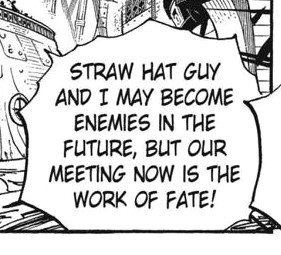
This entire panel between Ivankov and Law makes it funnier because he clocked him IMMEDIATELY.
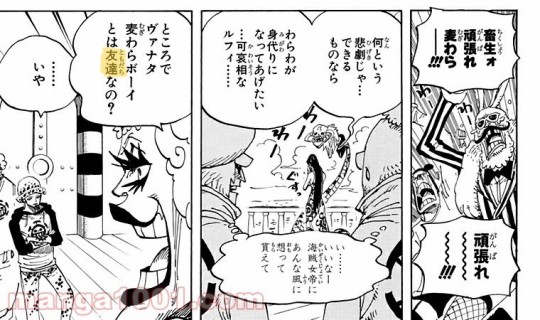
Ivankov asked if he's friends with Luffy to which he replied: no.
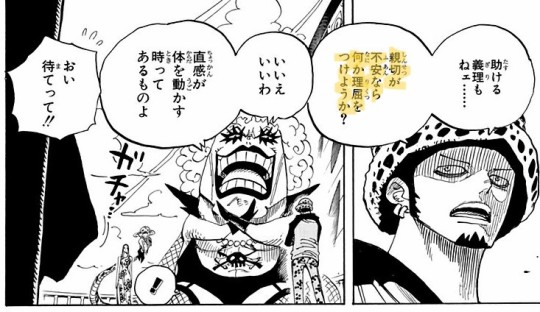
He also emphasized that that he doesn't have any obligation to help him but then went on to say this:
親切 (shinsetsu) means kind, generous, gentle, considerate. 不安 (fuan) refers to anxiety, uneasiness, worry, apprehension. These are surprisingly direct words but of course, Law had to go back and be cryptic again when he followed up with 理屈 (rikutsu), which could mean two things: theory, reason, logic or (unreasonable) argument, excuse.
I think this panel did a good job for translating it.
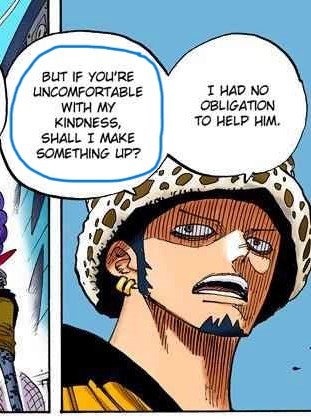
Law himself is providing Ivankov here the benefit of the doubt. To reiterate, Ivankov beats him to the punch which makes their entire interaction so funny.
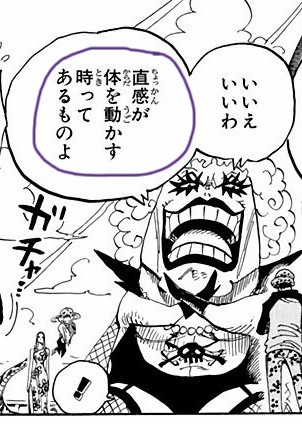

Again, brilliant translation for directly calling out Law's bullshit. Lmao. Ivankov says 直感 (chokkan) here. It means intuition, instinct, hunch. Please take the next statement that I will say with a grain of salt but "instinctively moving your body" is usually associated with the context of being reckless to the point of directly exposing oneself to danger, consequences be damned, in order to protect someone.
Even Law himself acknowledged that he's not obligated to be there, so why?
Unfortunately, this is the elephant in the room that Law will never address. Several characters even made sure to point out that he helped Luffy two years ago and he purposely dodges that topic.
One thing I can guarantee is that Law never did it to get Luffy to agree for the alliance. Hell, he thought of the alliance after reuniting with Luffy! He adjusted his plans by then. Additionally, he never used the fact that he saved Luffy's life as his bargaining chip and leverage to get him on board the alliance.
Lastly, this is too much for saving a life on a whim, isn't it, Law?
#one piece#one piece meta#marineford#monkey d luffy#luffy#law#trafalgar law#lawlu#istg marineford lawlu was the catalyst#this is self-indulgent at best#the feelings started at punk hazard and I am a firm believer of that#but you can't convince me that these moments between them didn't start something#it's clear from the get-go that law was interested to luffy#respected both the strength and the craziness even#don't even get me started on the ace and law parallels#ace protected luffy's life and law saved it#FUCK I AM NOT OKAY#mochiajclayne.txt#to highlight being interested in someone doesn't automatically mean romantic okay#that interest was enough for law to go in the middle of a war apparently#yeah I missed the alliance and I MISS LAWLU#lowkey wished luffy knew that law was holding his hat THE ENTIRE TIME in amazon lily#the anime did good on that scene tbh#he way his hold tightens on the brim of the strawhat when rayleigh said he knew luffy would be in amazon lily#still cackling at the “i was sunshine” “i was gay” lawlu tweet because it's so them
129 notes
·
View notes
Text
I’d count myself as a very casual Nandermo shipper, but the way the whole sitcom outtake bit was framed was just… very off-putting.
Spoilers below the cut.
Like, to introduce it, Nadja (in her characteristically condescending tone) says that she’ll just “make them hallucinate the ending they want”.
Which like, yes; Nadja would say that. But to then actually cut away to it, and in the context of a very, very meta episode… it really feels like the writers are just being shitty to the Nandermo enjoyers in the audience.
And the line Nadja says after the conclusion of that rather half-hearted St. Elsewhere reference (TIMELY!) feels similarly disparaging. (She says that the people who imagined that have “lost 15-20 IQ points.”)
Again, it is in character, and the hypnosis-IQ link has been set up previously, but it just felt… mean.
And like…. I get that writers can be annoyed by fan demands shaping the show, but it’s extremely ungracious to be nasty back to fans.
If I’m being really generous, I can see how perhaps they could have written it, and thought “Is it nasty? No, it’s not. It’s fine! It’s a joke. It’s in character.”
Buuuuut… I think maybe they needed to sit with it for a bit longer and reflect on the implicit part, because… it was ugly. And it shouldn’t have been in there.
( Honestly, the whole script felt like it needed a lot more time and care than it received. )
I also thought that the whole “It will be good when the cameras are gone” bit, and the “Climb into my coffin” bit were… like, if those parts weren’t queerbaiting, wtf is?
Like, the main/only narrative consequence of those sequences was to edge the Nandermo shippers in the audience, and like… for what? If it wasn’t just to be mean, was it to pad the run-time?
It was just… so stupid.
And again, I was never personally in the “If those two don’t kiss, I’m going to riot” camp. But the whole exercise just felt like it was meant as a gratuitous slap in the face to people who really liked this ship.
Like, the episode barely even had a plot. For a minute there, it felt like they were starting to do something with the monster and the Guide*, but instead, they just took a hard left into mocking the Nandermo fans in the audience for, I guess, the crime of being enthusiastic about the relationship between two characters.
*CW for sexual-exploitation / sexual assault implications in the last bit of this post (and no, I cannot believe I need to say this in a post about What We Do In the Shadows, but here we are).
~
~
~
~
~
~
* I did not love the idea that they were contemplating murdering one of their peers to turn her into basically a sex doll, and it was pretty well-established IN THE PILOT that murdering another vampire was a huge crime, but who cares anymore. Whatever. Fuck it.
#wwdits finale#wwdits#what we do in the shadows#nandermo#nandor the relentless#guillermo de la cruz#nandor x guillermo#wwdits nandor#nandor
114 notes
·
View notes
Text
ABOUT THE POLITICAL IMPLICATIONS OF THE LAND OF THE WAVES ARC, THE ACTIONS OF TEAM 7 AND WHY ITS ONE OF THE BEST ARCS OF THE ENTIRE FRANCHISE:
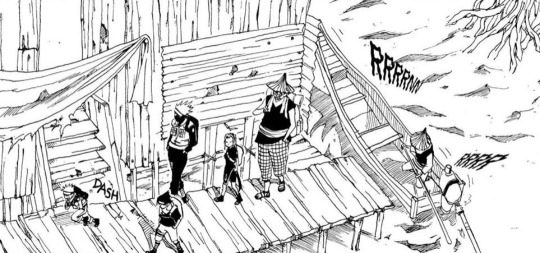
I'll never shut up about the Land of the Waves arc.
Here are the facts:
A corrupted man —who was believed to be the richest man in the world due his shipping and transportation business— decided he wanted to make his a small land made out of islands, better known as the Land of the Waves.
In Tazuna's words: "Nami No Kuni (the Land of the Waves) isn't a real prosperous land. Even our local lords are poor..."
The name of the corrupted man is Gato. He was affiliated with drug trafficking and contraband, as well as being a criminal who employed gangs and teams of shinobis to help him (through violence) to take over companies and countries alike. That's what he did to the Land of the Waves, taking hold of all the marine transportation and their shipping industry. Since the Land is made of a number of islands, Gato successfully isolated them. He was now the owner of the local economy and had the power to decide how people lived there.
Tazuna is an old man with no money at all who had been tasked to be the architect and overseer of the new bridge. If completed, it would mean that Gato no longer had absolute control over the Land of the Waves. It'd free them all, bring more movement to their economy and stop the crazy violence promoted by Gato's gangs.
To make sure we all understand the severity of the mission and the power of Gato, let's remember that he employed Zabuza Momochi.
Zabuza is one of the Seven Ninja Swordmen of the Hidden Mist. Kirigakure was known for one of the cruelest traditions regarding shinobis: they'd have to fight each other to death and only the survivors would be promoted. Zabuza put an end to it himself, killing an entire year of graduates. He was not even a student yet.
Zabuza also plotted a coup against the Mizukage, but he was betrayed. He became a rogue nin after that, taking money from men like Gato in order to keep living.
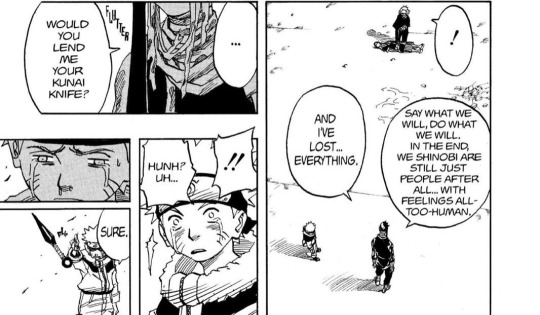
That's the first Team 7 mission.
Sakura, Naruto and Sasuke are staked to help Kakashi free a land of a corrupted businessman and in the process have to fight one of the most legendary shinobis they can encounter out there. We're talking about an entire small nation!!! We're talking about the insane irony of Zabuza being a rogue because he fought against the corruption of his own Hidden Village, and he lost and now he has to work for a man doing the same to others.
The first Team 7 lesson was not only to work as one, to value their teammates, but to question the world around them. Kakashi told them to not follow orders blindly and the narrative throws the Team on a mission to test it.
Kakashi accepted to continue the mission without telling the Hokage anything. He knew he had the jinchuriki and the last Uchiha with him, that it was a great risk, but he accepted because he wanted to help Tazuna and the Land of the Waves and he knew Tazuna had not enough money to pay for a class B mission. Hell, he was lucky Kakashi got a genin team. One of the best jonins of the Hidden Leaf could give his service under the disguise of a rank C. Kakashi was using a loophole to disobey orders and he complains the whole time in his head because he knows it's gonna be a mess of a mission, but he does it anyway.
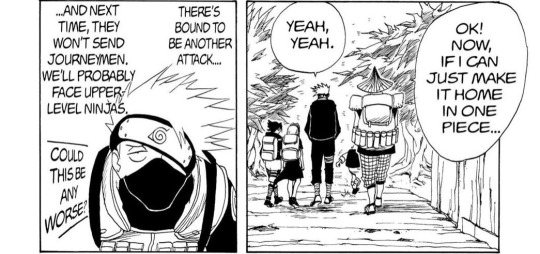
Do you want to know why is my favorite arc?
The reality of the Land of the Waves is a perfect scenario to force Team 7 to wake up. Naruto and Sasuke sure know loneliness and misery, but they were also part of a very rich land and a powerful Hidden Village. Sakura didn't go through anything like Sasuke or Naruto, which is worse in the sense that she was more naive than them.
Their world falls apart when they meet Haku and Zabuza, when they realize this is not s fairytale of good heroes and bad villains, but people who had to become violent to survive.
Like Kakashi said, the only reason he and Zabuza are trying to kill each other is because they were paid to do so. Zabuza works for Gato, Kakashi for Konoha, that's it. Kakashi didn't want to kill Haku and Haku didn't want to kill any of them, but the Naruto world is old and messy, the customs and the means to survive are others.
Shinobis are no heroes. They're mercenaries, they act as the military force for the strongest nations. They are tools and weapons. It's not advanced in any sense, so many years after the Warrant Era and the world was just as cruel and wild. People with kekkei genkais were forced to practice that violence to protect themselves, like Haku, Sasuke and Neji. People with bad luck like Naruto and all the jinchurikis were the same. People like Sakura, who loved and cared for those others, devoted their lives to joining the fight, to try and protect the ones dear to them.
That's why the final conversation of Team 7 —the one after the events of the bridge that ended with Zabuza and Haku dead— went the way it did. The members of Team 7 weren't happy with the reality of the shinobi life. Naruto even ended up saying that he would make his own ninja way, basically denying such reality and promising to break the traditional ways that kept all shinobis chained to violence, fated to kill each other.
Just look at it:
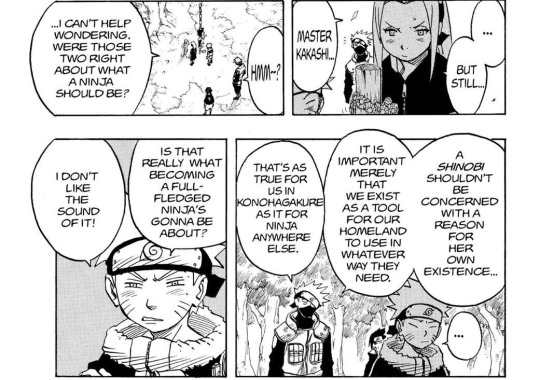
Sakura: ... But still... Master Kakashi...
Kakashi: Hmm~~?
Sakura: ... I can't help wondering. Were those two right about what a ninja should be?
Kakashi: A Shinobi shouldn't be concerned with a reason for her own existence... It is important merely that we exist as a tool for our homeland to use in whatever way they need. That's as true for us in Konohagakure as it for any ninja anywhere else.
Naruto: Is that really what becoming a full-fledged ninja's gonna be about? I don't like the sound of it!
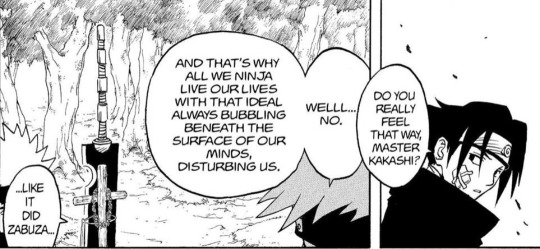
Sasuke: Do you really feel that way, master Kakashi?
Kakashi: Well... No. And that's why all we ninja live our lives with that ideal always bubbling beneath the surface of our minds, disturbing us. ... Like it did Zabuza ... And the boy.
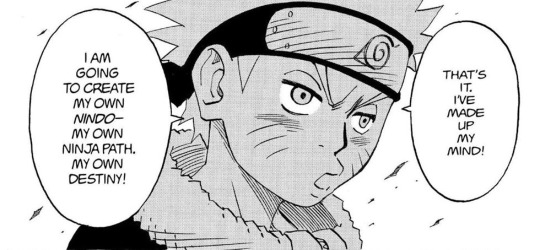
Naruto: That's it. I've made up my mind! I am going to create my own nindo— my own ninja path. My own destiny!
This arc plants the seeds of what should be the rest of Naruto and Naruto Shippuden. Team 7 is frustrated and they don't agree with the tradition. None of them, not even Kakashi. Naruto promises to be the change, to make his own destiny.
Sadly, it doesn't happen. The manga changes its tone halfway through. Naruto ends up becoming part of such tradition and he ends up being the fated reincarnation, the chosen one. His destiny is not his exactly and his own ninja path gets lost in the way, replaced by a hollower desire to become Hokage. Naruto doesn't evolve to deeply question the order of his world or his society.
Instead, Sasuke occupies his place and the story turns him into an antagonist (someone who wants the direct opposite of the protagonist, someone who is on the way of the protagonist to reach his goal). The story radicalizes the dream that was so innocently spoken in this chapter. It also ends up chaining Kakashi to the same system, uses him as someone to fill the Hokage role until Naruto is old enough and then gives Naruto the hat, forgetting the themes set on the Land of the Waves arc.
What started as Team 7 fighting corruption and people sick with power while trying to help the victims of the system, understanding that their world is made of greys and not moral absolutes, ends up becoming a kids tale of ninjas = heroes and aliens = villains. All the complexities of politics get softened by Black Zetsu's manipulations and Kaguya's existence.
It wouldn't be a reach to say that the Land of the Waves belongs to a very different type of manga, one that never got its continuation.
#naruto#land of the waves#land of the waves arc#naruto meta#Naruto classic#team 7#og team 7#team kakashi#kakashi hatake#naruto uzumaki#sakura haruno#sasuke uchiha#zabuza momochi#haku yuki#naruto gato
451 notes
·
View notes
Text
It’s interesting how Ned Stark’s dishonor has such far reaching implications throughout the plot. There’s a great irony in how rigid he is in his honor, yet he too fell victim to lust just as many men have before him. It’s not such a big deal if you think about it. I mean, all he did was to father a bastard, and how many men of his station have done the same? So it gives comfort to the rest of Westeros that even an honorable fool like Ned can stoop so low and be just like them. And we see that Ned’s dishonor affects so many characters. Jon Snow internalizes that he’s the shameful product of it and that causes him to join a penal colony, forever driving his need to prove that he too can be a worthy son of Ned. Catelyn Stark is constantly grappling with what it means to be a victim of it (to the point that she resents Jon and fears for her own children’s claims). It’s something that Jaime Lannister references in captivity, reasoning that he at least remained faithful to Cersei whereas “honorable” Ned Stark cheated on his lady wife. Robb probably saw the effects of Ned’s dishonor on his mother and brother, which probably drove him to break his marriage pact with the Freys and marry Jeyne Westerling (something that hastened his doom). Even Cersei dares to make a sexual pass at Ned while being accused of treason, no doubt emboldened in part by the knowledge that Ned at one point fell to lust. And everyone else knows of Ned Stark’s bastard (to the point that Davos gets some random exposition about how Ned dishonored himself on a fisherman’s daughter). Ned’s one act of dishonor is one of his most recognizable character traits and actually has a lot of implications throughout he narrative as it drives how many characters navigate the world around them. So isn’t it funny how it was all a lie?
#asoiaf#eddard stark#its so interesting how ned had to bring dishonor to himself to do the right thing#and how that essentially caused a ripple of effects throughout westeros#GRRM’s pitch letter makes reference to Jon’s parentage coming to light#so I’d be interested in seeing who will be left to learn the truth#and how that will cause people to act and rethink a few things#for jon especially since lbr Ned’s dishonor is all about him and affects him on a far greater scale#but also for people like jaime who have the topic of honor come up in their narratives#not as a gotcha moment but more of a “huh so that happened” type of thing#jon snow#catelyn stark#jaime lannister#cersei lannister#robb stark#valyrianscrolls
594 notes
·
View notes
Text
My fellow Haladriels I do not know who has told you that according to The Lore elves can only love once, but a) this is not The Lore, and b) also in Tolkien 'The Lore' does not really work like that anyway.
In the words of Galadriel's grandfather Finwë:
It is unlawful to have two wives, but one may love two women, each differently, and without diminishing one love by another. Love of Indis did not drive out love of Míriel, so now pity for Míriel doth not lessen my heart's care for Indis.
What is rare is elf remarriage, and this is partly because of the absolute drama that Finwë's led to.
Also: the law on when remarriage is and isn't allowed is set down by the Valar in Valinor to the elves living there. What the elves living in Middle-earth made of this - if they even heard of it, and how would they? - is unrecorded. Many of us have written fanfic that plays around with a culture clash on this issue!
Also also: the Noldor do not always do what the Valar explicitly tell them to do Or Else, which is how come Galadriel and many of her extended family are back in Middle-earth anyway.
Also also also, and (for me!) most importantly: there is no The Lore anyway, in the sense that people citing it in that sense mean (i.e. a rulebook for this fictional universe setting out what is true and what isn't and how everything works). There is a massive collection of notes, thoughts, essays, letters, stories finished and unfinished and drastically revised, much of it contradicting other bits earlier or later, some of it managing to contradict itself.
Also also also also, much of what is there is in this posthumously published material is presented (explicitly or by implication) within a framing narrative of something reported by a fictional character - as indeed are LOTR and The Hobbit. For example, there's an essay on how elf marriage works as part of 'Laws and Customs among the Eldar' in the History of Middle-earth; it's very unclear whose perspective this is written from; it's associated with a narrator called 'Ælfwine', who in some versions of some Tolkien things is a human who wrote about what an elf called Pengolodh told him about the history of Arda. Also there are Vikings but they're not important.
None of this means 'The Lore' is not important - it's fascinating, I recommend it to everyone, there's some amazing stuff in there - but it's not 'important' in the sense of being like a list of what is and isn't True. It's important in the sense of being mythology, being a collection of texts we can write stories about and frown at and go "I feel like Melian is getting away with far too much nonsense here" about and occasionally send each other snippets of saying things like "fyi there's a version where Maedhros and Earendil and Elwing all end up in the flying ship together, thought you'd appreciate this one" and so on.
#tolkien#haladriel#now pls embrace the spirit of Finwe and ship and let ship#not even getting into Celeborn's other marriage or that thing about how wild elf sex is#or steampunk Numenor#Tolkien wrote mythology not a list of Wiki articles!#eyeofacat meta
78 notes
·
View notes